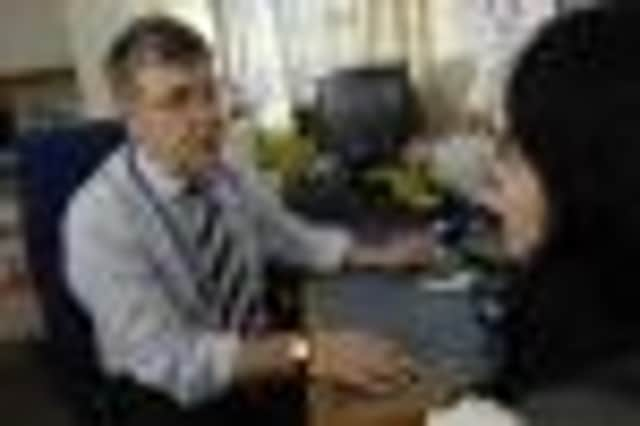Public cash ‘could top up pensions for striking doctors’


Dr Brian Keighley, chair of the British Medical Associations’s Scottish Council, accused the SNP of double standards, saying that despite opposing the pension reforms it continued to refuse to take any action to prevent them being forced on Scotland’s doctors.
He said the Scottish Government had the power to top-up doctors’ pensions and said that unless ministers showed they were willing to consider this then more strikes would follow.
Advertisement
Hide AdAdvertisement
Hide AdDr Keighley told the BMA’s annual conference in Bournemouth: “We hear the rhetoric of John Swinney and Nicola Sturgeon but have been forced into industrial action because the Scottish Government has not, thus far, modified one iota of what has come from Whitehall.
“They want it both ways – intellectual recognition of inequity but then not making any pragmatic modification to the effects on its hard-working workforce.”
The GP said the SNP could use money from Scotland’s block grant from Westminster to cover the doctors’ increased pension contributions and to keep their retirement age at 60 and not force them to work a further eight years.
The changes would also mean younger doctors paying an additional £200,000 over their lifetime in pension contributions. Dr Keighley said: “Doctors recognise the parlous state of public finance and we will take our fair share of the pain but refuse to be made the whipping boy and easy target of a cynical UK government.
“However, we need an imaginative approach from the Scottish Government to stop further strike action in Scotland.
“I would ask the government to throw us some sort of concession to show they are willing to take another approach.
“In reality, the amount of money this would cost them would be very limited.”
Doctors will vote on further industrial action at the close of the conference today, but already many have warned they would be willing to take “more and stronger action” against the pension changes.
Advertisement
Hide AdAdvertisement
Hide AdAn emergency motion for doctors to withdraw all work with the exception of emergency care in any future strike action – meaning they would not attend their normal place of work – will also be voted on.
Doctors will also consider linking up with other public- sector unions when taking further industrial action.
Around 3,800 operations were cancelled in Scotland when doctors went on 24-hour strike earlier this month for the first time in almost 40 years.
More than 60 per cent of Scottish doctors who are BMA members took part in the action, a higher proportion than across the rest of the UK.
The BMA said it was being forced into the action and has continued to apologise to patients for the uncertainty over the possibility of more disruption to NHS services.
On Tuesday, BMA chairman Hamish Meldrum told the conference doctors risked alienating themselves from patients the longer their dispute over pension reforms went on.
Labour health spokesman Dr Richard Simpson MSP last night warned health secretary Nicola Sturgeon she was losing the confidence of medical professionals with “a growing list of failings under her management of the NHS”.
He said: “The real risk is that this deteriorates into a full-blown crisis of confidence and leadership in the NHS in Scotland.”
Advertisement
Hide AdAdvertisement
Hide AdScottish Conservative health spokesman Jackson Carlaw criticised doctors for considering further strike action and said the dispute was putting a strain on the NHS.
He said: “Dr Keighley’s comments are totally undermined by the unprincipled industrial action he has sought to justify.
“The BMA cannot complain about Scotland’s NHS when its actions are adding to the strains already being faced. If the BMA wishes to be taken seriously they must learn to behave and comment responsibly.”
Dr Alan McDevitt, chair of BMA Scotland’s general practitioners committee, has told how he did not expect sympathy from the public over the value of doctor’s pensions.
He said the pensions would have an annual surplus of at least £2 billion for at least the next five years. He said: “This is about the government imposing a raft of changes without discussion, without being prepared to discuss any aspects of it, and just saying, ‘You’ll take it and that’s how it’s going to be’.”
The Scottish Government last night said it remained in talks with the BMA and opposed to the pension reforms which would see some doctors pay an additional 14.5 per cent towards their pensions.
Ms Sturgeon has told how she “sympathises” with doctors, but has continued to say this is a Westminster-led issue.
A Scottish Government spokeswoman said: “We remain willing to work in partnership with NHS trade unions to find a way forward on the pensions issue within the constraints imposed on us and urge the BMA to continue to be part of that.”
Advertisement
Hide AdAdvertisement
Hide AdThe doctors’ position comes just weeks after Scotland’s largest teaching union, the EIS, also called on the Scottish Government to “make clear” its position on pension reform for teachers.
EIS general secretary Ronnie Smith said the union was “very concerned” ministers were failing to engage with unions to discuss changes to the Scottish Teachers’ Superannuation Scheme. Teachers across Scotland took part in their first nationwide walkout for 25 years last November against the proposed changes.